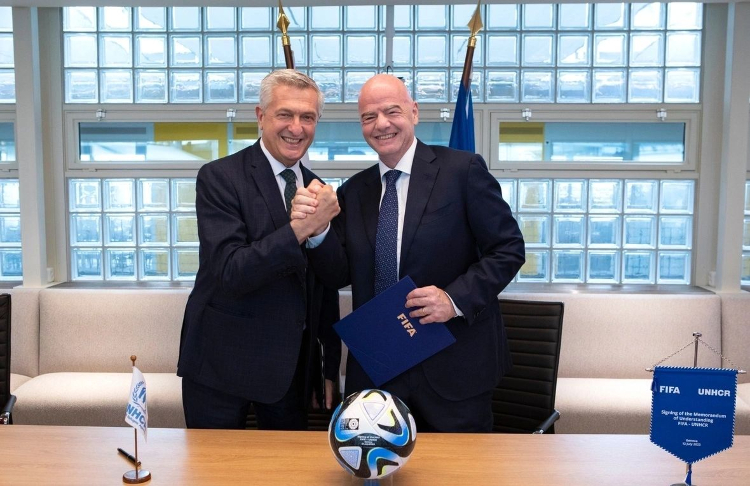FIFA,UNHCR agree to give refugees more opportunities

Football’s global governing body FIFA and UNHCR, the UN Refugee Agency, Wednesday signed a Memorandum of Understanding (MoU) to work closely with those forcibly displaced from their homes and help to strengthen communities through enhanced access to football, education and other opportunities.
The signing ceremony in Geneva, Switzerland, was conducted by FIFA President Gianni Infantino and Filippo Grandi, the UN High Commissioner for Refugees – with both leaders committing to an ongoing relationship to use the power of football to positively impact global society, a key pillar of the FIFA President’s Vision.
UNHCR’s mandate is to help those forced to flee their homes because of conflict and persecution.
Currently, more than 110 million people are forcibly displaced, a number that’s never been higher, with the vast majority hosted in low- and middle-income countries.
The signing ceremony comes just days before the FIFA Women’s World Cup in Australia and New Zealand begins, with the newly-formalized partnership to be active throughout.
It builds on a collaboration over the last four years between FIFA and UNHCR.
In March 2022, FIFA and UNHCR united in a global appeal to raise funds for people displaced by the conflict in Ukraine.
Under the terms of the MoU, the two entities will continue to build this partnership through football activities and projects promoting social cohesion, education and youth development, with a focus on providing solutions and opportunities through sports.
FIFA and UNHCR will also collaborate to ensure football players in need of international protection are appropriately supported.
Speaking shortly after the signing ceremony, FIFA President Infantino said: “I thank UN High Commissioner Grandi for the role UNHCR has played in bringing our two organizations together.
“I look forward to a fruitful, meaningful and impactful partnership. We believe very much in this collaboration, and I would like to assure you my personal commitment to make our little contribution, to give a little bit of a smile to children, but also to adults like us, who remain children when they see a ball, all around the world. We often say that football has the power to unite the world, and the work FIFA and UNHCR will assume together because of this agreement is a clear commitment to that.”
He continued: “We are ready to work together, to collaborate in the different refugee camps and the different areas where there is a need.
“The more people we reach at first – a few at least – and especially the more kids we reach around the world, the better. Additionally, via projects supported by the FIFA Foundation, there is a particular focus on improving the lives of displaced people worldwide, empowering them to restart their lives and to contribute to their new community.”
UNHCR High Commissioner Grandi said: “Football is the world’s most popular sport, with players coming from every corner of the globe, including many refugees.
“For displaced people, football can be a game-changer to help overcome the many challenges they face. Crucially, it fosters inclusion in the communities where they have found safety.”
Grandi continued: “With this partnership, football is showing real solidarity with the many millions who have been forced to flee – as well as their hosts. We look forward to seeing tangible results from this important collaboration.”
The FIFA Women’s World Cup in Australia and New Zealand is expected to reach a global audience of 2 billion people, and, in line with commitments outlined in the MoU, the two parties will use the tournament to call for the football community to Unite for Peace.
During the round of 16 matches, team captains will be invited to wear armbands promoting this cause alongside messages on pitchside LEDs, stadium big screens and social media, reaching a global audience and providing huge exposure for this crucial message.
FIFA and UNHCR will also partner to spread awareness around key annual international dates, such as World Refugee Day, and will continue to deliver joint activations and campaigns – all of which aim at supporting UNHCR’s life-saving humanitarian assistance as well as its focus to create long-term solutions for refugees.

